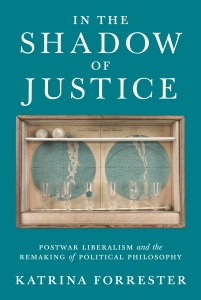Book Review | In the Shadow of Justice: Postwar Liberalism and the Remaking of Political Philosophy by Katrina Forrester
In In the Shadow of Justice: Postwar Liberalism and the Remaking of Political Philosophy, Katrina Forrester explores how John Rawls’s justice theory became the dominant way of thinking about institutions and individuals in the second half of the twentieth century. This important work sheds light on the conceptual roots of modern political thought while at the same time disclosing its limits, writes Rahel Süß.

Image Credit: Scales of Justice, Brisbane Courts (John CC BY SA 2.0)
In the Shadow of Justice: Postwar Liberalism and the Remaking of Political Philosophy. Katrina Forrester. Princeton University Press. 2019.

In her new book In the Shadow of Justice: Postwar Liberalism and the Remaking of Political Philosophy, Katrina Forrester introduces readers to the construction of modern liberal thought and its relationship to politics. She turns to the distinct political events and ideas that shaped political liberalism and convincingly elaborates how John Rawls’s justice theory became the dominant way of thinking about institutions and individuals in the second half of the twentieth century. In particular, Forrester assembles an array of perspectives around one essential question: what circumstances have led to Anglophone political theorists operating in the shadow of Rawls’s justice theory?
The current debates over a crisis of political liberalism reveal the need for a more precise inquiry into this question. Forrester’s book takes on this task, providing illuminating insights particularly by unfolding the ways in which Rawls’s theory has pressed its stamp on the post-war liberal canon. Drawing on archival sources from Harvard University, Princeton University and Columbia University, among others, Forrester devotes particular attention to the debates that have set the standards for a just society. Using the core liberal question – whether a society can be justified to all its members in light of inequalities – as a point of departure, she traces the emergence of two liberal principles: firstly, the principle of civil liberties and personal rights; and secondly, the principle of equality. The key assumption underpinning the latter principle is that economic inequalities should be tolerated if they improve the situations of the least advantaged in a society.
Forrester’s In the Shadow of Justice represents her broader research interest in the history of twentieth-century social and political thought and its implications for political theory. The particular focus of the book is on the revival of political thought brought about by Rawls’s justice theory following a period of economic depression and World War II that had left philosophers unable to think about justice. Despite widespread reservations about its universal ethical implications and contradicting political events, Forrester explores how, ultimately, philosophical liberalism became synonymous with Rawls’s political theory.
The bulk of the book is made up of critical commentaries on political events and intellectual debates that shaped political liberalism in the US and Britain in the post-war era. There are several powerful arguments animating the eight chapters of Forrester’s book. In an introductory spirit, Chapter One turns to the question of the making of justice theory and frames the wider analytical project. Following up on the problem of justification, Forrester subsequently discusses ideas about obligation and civil disobedience (2) and those of war and responsibility (3). In Chapter Four the author grapples with some of the attempts to reconstruct and rethink Rawls’s framework, before focusing in more detail on accounts of global justice in the context of decolonisation in Chapter Five. Turning to the problem of the future (6) and the New Right and New Left (7), Forrester brings into conversation liberal egalitarianism with concepts of markets, choice and responsibility. In Chapter Eight, she conclusively shifts attention to the limitations of political philosophy and makes a strong point for questioning the currency of liberal thought to understand the times in which we live.
Returning to look at Forrester’s argument in more detail, it becomes clear that the book provides an original contribution to understanding the transformation of liberal thought since the second half of the twentieth century. As carefully described by the author, such a transformation was due to a number of conceptual updates by political theorists – among them Thomas Nagel, Ronald Dworkin, Robert Nozick and Michael Walzer – in light of distinctive political moments. Forrester illuminates how Rawls’s justice theory survived the radical protests and the rise of the New Left of the 1960s (40), the hollowing out of the welfare state in the 1970s (206) and the New Right’s assumptions about the nature of politics, institutions, personhood and the individual in the 1980s (211). Notably, what appears as a conflict at first glance – the idea of distributive justice pitted against neoliberal pledges for privatisation, financialisation and institutional interdependence – is revealed by Forrester to have become a story of profound philosophical success. As many political theorists deployed ideas surrounding markets, choice and responsibility within a Rawlsian framework, liberal egalitarianism subsequently became the dominant mode of theorising by the 1980s. Ultimately, however, this success has been shadowed by what Forrester calls the ‘problem of the future’ (172).
Engaging with a number of influential critics, such as Bernard Williams, Judith Shklar, Michael Sandel and Charles Taylor, Forrester shows how liberal thought increasingly came to be detached from concrete political experiences, and hence the possibility of accommodating future demands in the justice theory. This was partly due to its emphasis on ideal speech, consensus-seeking deliberation and legalistic formulations of political problems on the back of political conflict and collective action. As critically reflected upon by Forrester: ‘Rawls’s theory was a contract theory, and contracts with the future were hard to envisage’ (176).
In order to get around such limitations, liberal theorists made use of a hypothetical construction and a set of moral constraints. While the latter suggests that ‘morality was time-neutral’ (180), the hypothetical assumption is modelled on a thought experiment that Rawls called the ‘original position’ (3). According to this idea, all parties share ‘a fixed temporal location in the present from which they chose the principles to govern the future’ (177). Essential for this experimental line of thought is that the parties are blinded by a ‘veil of ignorance’ (35), meaning that they do not know to which social group they would belong in the society they imagine. This idea is followed by the assumption that parties would choose principles that provide the best option for the least advantaged in a society. Nonetheless, critics claim that this high level of abstraction ultimately relies on the idea that social life rests on the possibility of consensus and ethical agreement.
Forrester’s In the Shadow of Justice will particularly benefit scholars and students of philosophy, politics and history concerned with the future of political liberalism. Her important work provides a unique resource for shedding light on the conceptual roots of modern political thought while at the same time disclosing its limits.
This review gives the views of the author, and not the position of Democratic Audit. It was first published on the LSE Review of Books blog.
Rahel Süß is a political theorist and currently a visiting scholar at Duke University’s Literature Program and Fellow at the Social Movements Lab at Duke´s Franklin Humanities Institute. Her research focus is on the contemporary crisis of liberal democracy and the role experimental action plays in its transformation. Rahel is the author and co-editor of several books and articles and the co-editor of engagée, a journal at the intersection of politics, philosophy, and art. @RahelSuess





 Democratic Audit's core funding is provided by the Joseph Rowntree Charitable Trust. Additional funding is provided by the London School of Economics.
Democratic Audit's core funding is provided by the Joseph Rowntree Charitable Trust. Additional funding is provided by the London School of Economics.